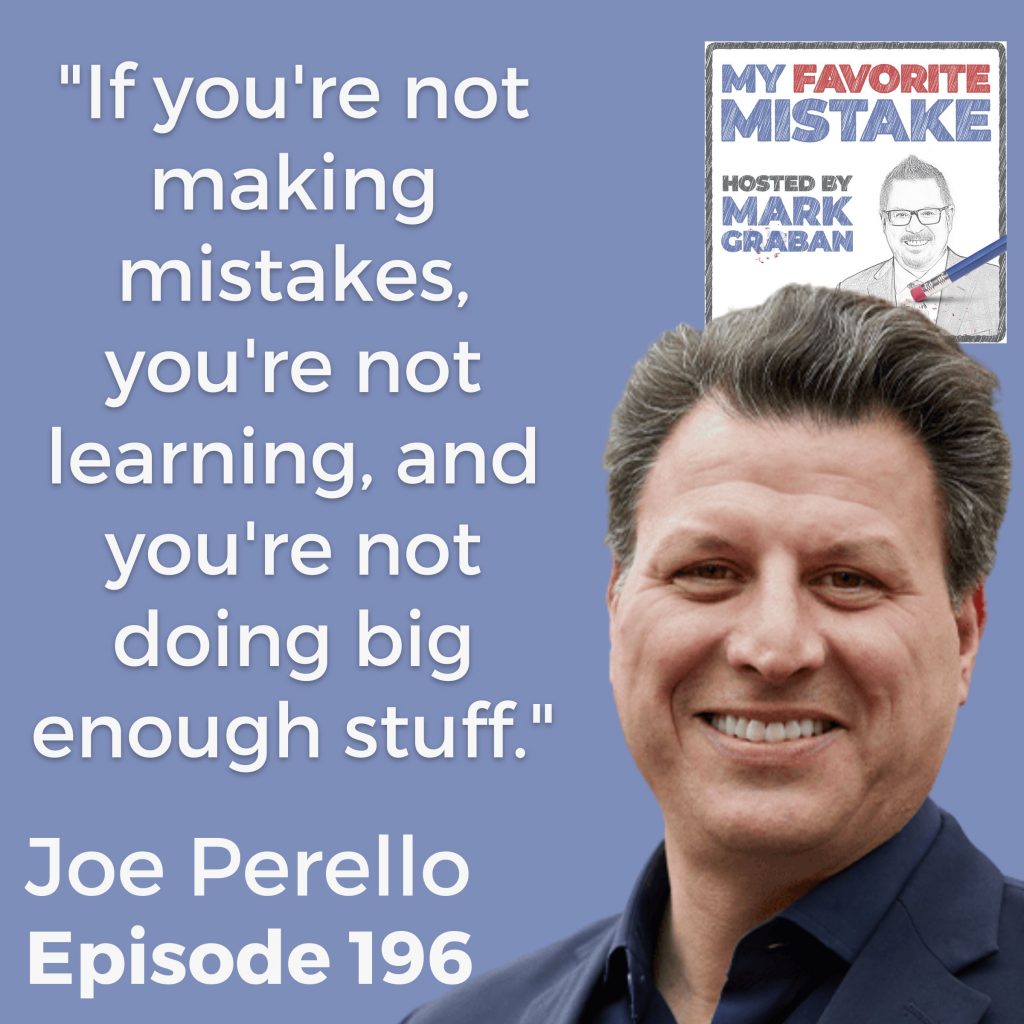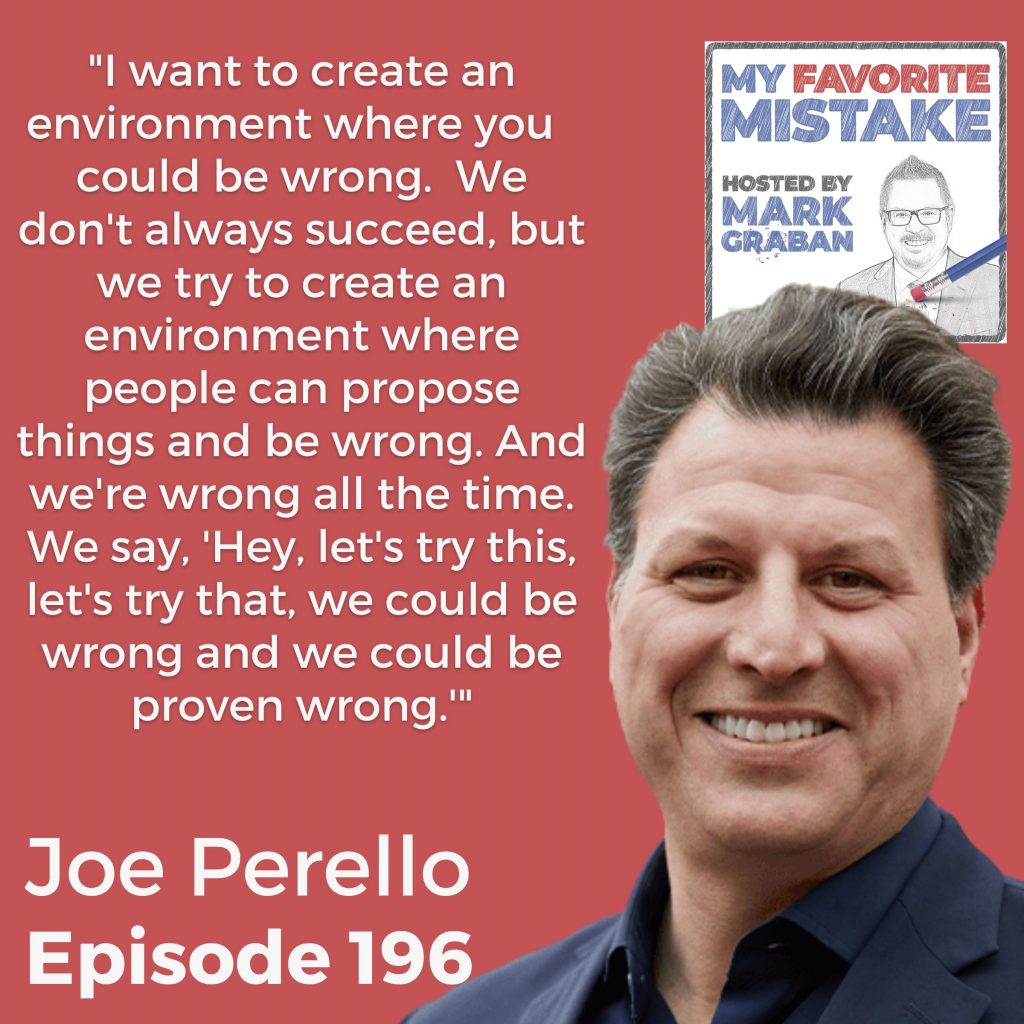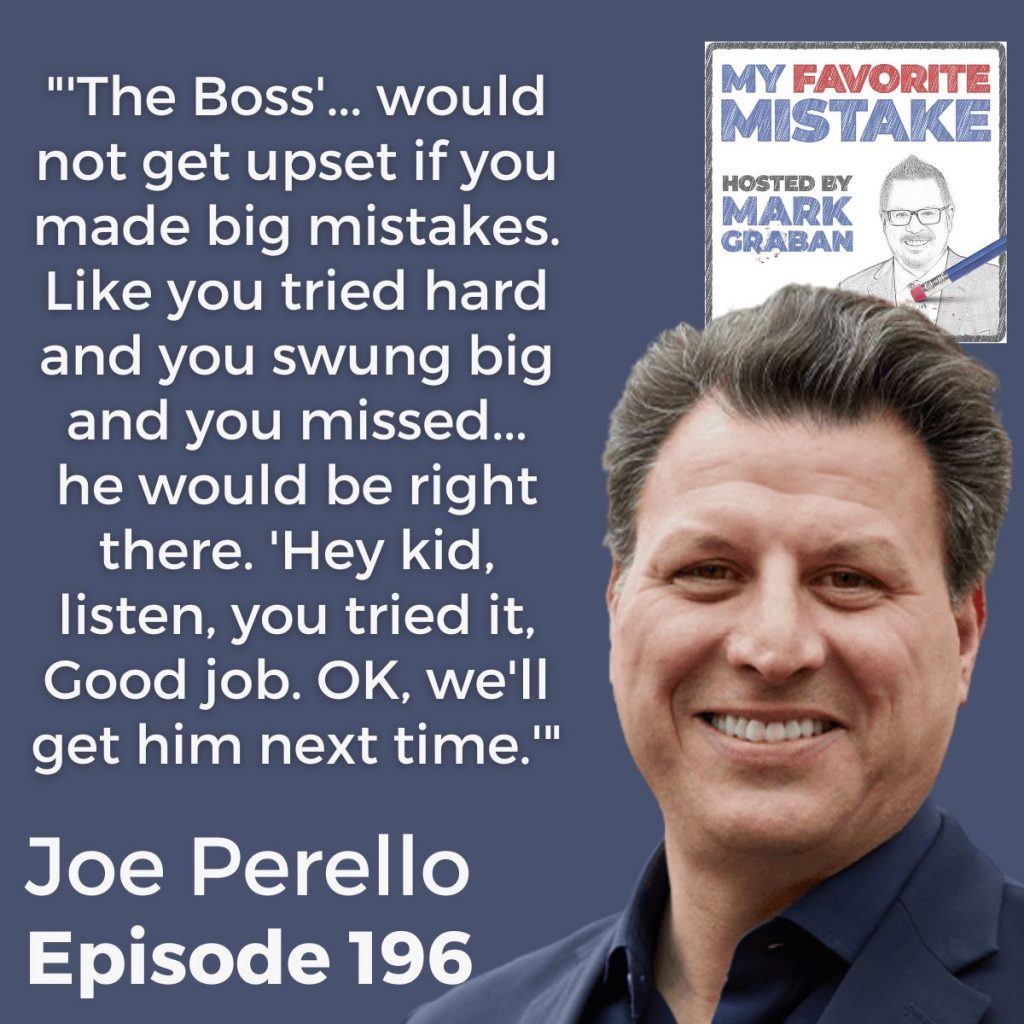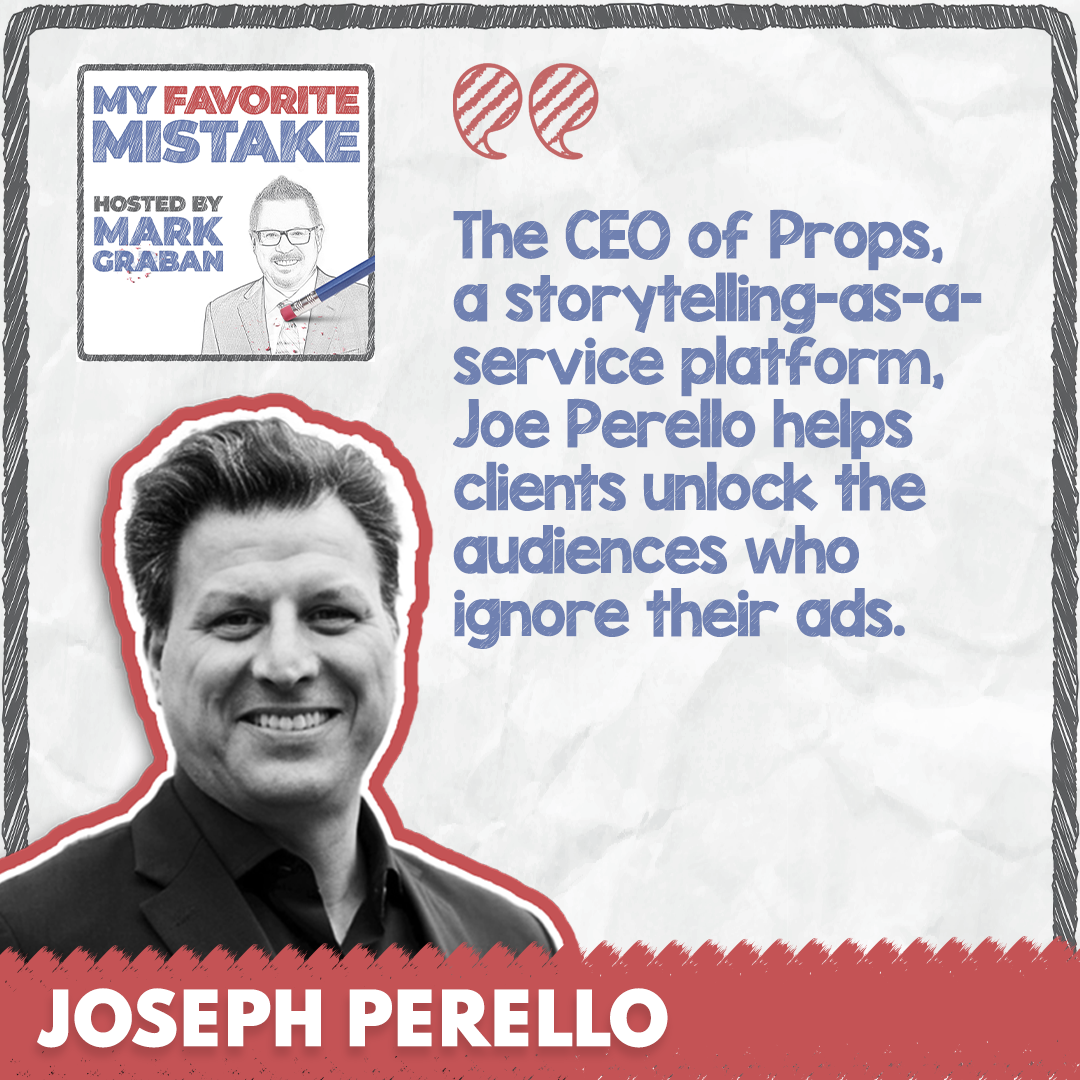Listen:
Check out all episodes on the My Favorite Mistake main page.
My guest for Episode #196 of the My Favorite Mistake podcast is Joe Perello, the President and CEO of Props, a first-of-its-kind, marketing technology platform enabling DTC brands. Joe is also a member of the board of directors of New York Cruise Lines.
Prior to Props, he co-founded and led an NYC-based digital agency and bootstrapped it into an award-winning shop.
In 2003, Mayor Michael Bloomberg appointed Joe as the first Chief Marketing Officer of the City of New York. Joe and his team created the first self-funded marketing and promotional engine in the City's history, generating more than $100 million and paving the way for unprecedented results in tourism.
Joe was the Vice President of Business Development for the New York Yankees during some of their most successful seasons, reporting to the late George M. Steinbrenner.
In this episode, Joe tells his favorite mistake story about a “work divorce” that was “really hard” — was it a mistake to separate himself from a company and certain workplace relationships? How did he learn to take responsibility for those relationships? We also discuss how to create a culture of learning from mistakes and creating an environment where you can be wrong.
Questions and Topics:
- Work divorces are hard… it WAS the right thing to do
- Felt like it WAS a mistake as it happened – turned out to be best…
- Fear — no idea what I was going to do next…. — uncertainty or a mistake
- It’s always a judgment call – a mistake or not??
- The founder dynamic made it more difficult – personal pride
- Lessons learned to prevent future work divorces??
- Culture of learning from mistakes? “Create an environment where you can be wrong…”
- Getting things wrong helps us get it right??
- “I don’t want to be right I just want to win”
- Direct marketing – test and learn, test and learn
- Fail fast, fail often?
- Props – how did the company pivot??
- Mistakes that marketers make? Being inauthentic or failed attempt at authenticity that didn’t ring true?
- Mistaken perceptions of the late George Steinbrenner… public perception vs reality?
Find Joe on Social Media:
Watch the Full Episode:
Quotes:



Subscribe, Follow, Support, Rate, and Review!
Please follow, rate, and review via Apple Podcasts or Podchaser or your favorite app — that helps others find this content and you'll be sure to get future episodes as they are released weekly. You can also become a financial supporter of the show through Anchor.fm.
You can now sign up to get new episodes via email, to make sure you don't miss an episode.
This podcast is part of the Lean Communicators network.

Other Ways to Subscribe or Follow — Apps & Email
Joe Perello, CEO Of Props, On Building Strong Work Relationships And A Culture Of Learning From Mistakes

Our guest is Joe Perello. He is the President and CEO of Props, a first-of-its-kind marketing technology platform that enables direct-to-consumer brands. You can learn more at their website, www.Props.co. He is also a member of the Board of Directors of New York Cruise Lines. Before I tell you more about his interesting career and before I stumble over for more words, Joe, welcome to the show. How are you?
Mark, thank you for having me. It is good to be here. I appreciate it.
I'm excited to hear your story. There is a lot we can talk about here. Prior to props, Joe cofounded and led a New York-based digital agency. He bootstrapped that into an award-winning shop. In 2003, Mayor Michael Bloomberg appointed Joe to be the first Chief Marketing Officer of the City of New York. Joe and his team created the first self-funded marketing and promotional engine in the city's history. They generated more than $100 million and led to unprecedented results in tourism.
He was also the Vice President of Business Development for the New York Yankees. During some of their most successful seasons, he reported to the late George Steinbrenner. Joe is a graduate of the University of Delaware with a degree in History or Journalism. Thank you for being here. I'm interested in New York Yankees' history. Was that part of your draw for taking a job there?
No. I worked for a credit card bank at the time called MBNA America, and the Yankees were my client. I visit them all the time. I got to know their head of marketing. His name is Derek Schiller. He is the CEO of the Atlanta Braves and their sports properties. I got to know Derek well. He was like, “I'm going to leave here. Do you want to take my job?” I said, “Sure, I love to.” There was no plan to be the VP of the New York Yankees. It happened and I got lucky.
I'm glad you could take advantage of that opportunity. As they say, “Luck benefits the prepared.” There is more than luck involved there. Maybe we can come back and talk a little bit about that in addition to your company, Props. Joe, as we normally do here. I would love to hear your story, thinking back on the different things you have done. What is your favorite mistake?
I thought about this a lot. The premise of the show is great because if you are not making mistakes and not doing big enough stuff, you are not learning. The biggest mistake I made that turned out not to be a mistake was separating myself from certain relationships with people. I thought that I was making a mistake at the time. The reason is that I was professionally raised as a networker.
[bctt tweet=”If you’re not making mistakes, you’re not learning, and you’re not doing big enough stuff.” via=”no”]
Biz dev and sales are important. I have been in marketing my whole life. In marketing, you grow, make more connections, and build more relationships. You don't shrink. If you are shrinking, you are failing. I would try and build relationships with as many people as I could because I thought that was our pathway to success. It wasn't until I was much older. I started to be more disciplined about the relationships that I would invest time in.
This was still hard for me to say no to someone, especially as a networker or a growth person. I was in a business relationship with people. I had a hard time separating, and I didn’t. It was difficult. I felt in my bones that it was the wrong thing to do. I felt like I was making a mistake by severing my relationship with these business associates.
It turned out to be the best thing and the smartest thing I ever did because it put me on a path toward where I am now, which is the cofounder of a software company. I’m in charge of my own destiny to a large degree and unencumbered by relationships that I didn't get. It was hard for me to do it at the time, but it turned out to be the right thing to do.
Did that mean leaving a company?
Yes, leaving a company that I helped start.
I want to make sure it meant leaving a company, not breaking off, “I'm not going to meet you for lunch every month anymore,” or whatever the networking was.
I include those in there, but those are easier. I have separated myself from certain people. I decided, “I wasn't going to invest any more time in this relationship.” Those were hard to do because as a biz dev person, you are like, “They could be a prospect one day. They could turn into something.” I made this decision and my wife has been a big part of it because she is more tough when it comes to relationships with me. She is more skeptical in a good way than I am. I'm like, “No, everyone is great. It is all great. We are all going to be fine.”
It could be the mistake of being a little too trusting.
I wouldn't say trusting, but more willing to invest the time into the relationship to see where it would come. My wife has rubbed off on me in a good way.
When you left that company, what were the reasons for doing so? Why would you do it if it felt like a mistake at the time?
It is a work divorce. Divorces are hard. I could have said, “No, I'm going to make this work. I'm going to separate.” The right thing to do was to separate because I wanted to go one way. My colleagues wanted to go another way. The relationship was deteriorating anyway. It was the right thing to do for them and me. It was hard to do at the time to say, “I'm going to separate.”
It sounds like you knew it was the right thing to do. Was there fear of what’s next? Was that not lined up clearly?
I had no idea what I was going to do next. That is where the fear was. It was like, “This relationship isn't working. I probably could make it work.” I don't have a safety net. The fear stepped in big time. I did this at a point in my life when I had mortgages, private school, and tuition like most middle-aged guys have.
What I hear you saying is it was necessary but it was painful. It created a lot of uncertainty. How did you come to start viewing it as the best thing that happened to you? It was feeling like a mistake, or it was feeling uncertain. What happened next?
It is ironic how things happened. I remember taking the train home that day feeling down. This has ended. I’m not sure if I got anything out of the relationship. Of course, I did in hindsight. A friend called me. He was like, “I came across this company. They are looking for a leader. I thought you would be great. Can I connect you to the cofounder?” It was that day I was on the train. I don't know if I clung to that because I was so unclear on what I was going to do, but I ended up coming to meet the cofounders of what Props used to be.
It is a different company. I met the investors and they recruited me. That set me on this path. At that point, not soon after, I was like, “This is probably a good thing. I'm glad I severed this relationship.” I don't want you to make it seem like I'm just cutting people off left and right. I can count on one hand how many people I have said, “No more.”
Big decisions like these are difficult. There is the judgment call. If you think you are making the best decision at the moment, sometimes time reveals that was a mistake. I had guests here talk about the mistake of leaving some job too soon. Someone else has a story about I stuck with that for too long. It could be a mistake to stick with something. Do we stick with it? Do we say, “It is not working,” and move on? These are difficult judgment calls. We might not have 100% clarity before making a decision.
It is hard, especially if you are a part of making the enterprise. At some point, it feels like you have to cut off one of your fingers. It clouds your judgment. Your personal pride is involved. If anyone has their ego in shock, your personal pride plays a big role in this. There is the fear of the uncertainty of the future. There is always, “Someone is going to judge my career.” None of that stuff matters.
I look back at it and I'm like, “I learned so much from what I did running an advertising agency.” I'm applying it every single day and teaching the younger staff that I have how to manage clients and set their expectations the right way, and say no to clients that I don't think are going to pay out. All of that is valuable in my work. I’m teaching my team how to jump over the fifteen years of me doing that. I’m like, “If I could teach them how to do that, that would be great.”

I appreciate you mentioning the learning joke because that is what the show here is meant to celebrate. It is not to make ourselves feel bad about our mistakes but to celebrate learning and growth. You are alluding to that. I was going to ask a follow-up question. If that previous situation was something you described as a work divorce, were there any lessons learned or reflections? Is there anything you could do differently to prevent some of that situation from popping up in the future?
The first thing is you have to take responsibility for the relationships you have built. In the heat of battle, you could lay blame on others. I could have managed a relationship differently. That doesn't mean that the outcome may have been different. I looked and said, “How could I have managed this relationship differently so that I could have positively changed things?”

Number one is I took responsibility for the relationships and how they worked out. I took a lot of lessons from that. It can't always be one-sided. You have to protect your integrity and what you care about, but you also have to compromise every single day. When I look back on things, I was like, “I wasn't willing to compromise on certain things.” That certainly contributed to our relationship. I take responsibility for that. It has also helped me in my new endeavor saying, “You have to take responsibility. You are not perfect. Other people's points of view matter. It’s likely that they are probably better, and you should listen to them.”
I appreciate you sharing that. We can take responsibility for our own actions or inaction. A working relationship in an organization is more complex. You can learn and do things differently. It doesn't mean the situation is necessarily going to work out because other people have the role they play. You made certain mistakes along the way, and they have also made mistakes.
You could only take responsibility for your own behavior. You cannot control how everyone else is going to behave. It got me into a craze nowadays, but I started reading. Ryan Holiday became popular at the time that I was going through this. It was appropriate because his whole approach to stoicism is focused on the things you can control. It has always been a mantra of mine.
At the time, I started taking that to heart. I had time. I could read. That made a big difference for me. What can I control here? The only thing you control is your own behavior and reaction to what happens to you. You can't control other people's behavior. You have to take responsibility for yourself, and you can only control how you react to things and do your best.
It is interesting within a team dynamic if people are making mistakes and admitting mistakes. If both sides or multiple parties within a team are willing to admit mistakes and work through them, that is helpful in terms of relationships. If everyone doubles down or digs in on their mistake, it is not the mistake of what I said. It is your mistake in how you reacted to it. That could get dysfunctional.
That has been a tenet of how we work at Props. Part of it is because I want to create an environment where you could be wrong. Our cofounder, Oliver Blodgett, feels the same way. We don't always succeed, but we try to create an environment where people can propose things and be wrong. We are wrong all the time. When we say, “Let's try this. Let's try that,” we could be wrong and we could be proven wrong. We were like, “Yes, we were wrong. Move on. It is not the end of the world. We don't know everything.”
[bctt tweet=”I want to create an environment where you could be wrong. We don’t always succeed, but we try to create an environment where people can propose things and be wrong. We’re wrong all the time. We say, “Let’s try this or try that. We could be wrong, and we could be proven wrong.”” via=”no”]
It is harder when you got younger staff because they don't want to look bad. Everyone wants to look good. I want to look good. Everyone wants to look good. You don't want to look stupid. You have to go out of your way to say, “There are no bad ideas. Everyone speaks up.” You then match that with the intensity of performing every day. There is like, “I want everyone to speak up, but we also have to deliver for the client. Therefore, either we perform or we are out.”
You have to manage the intensity of delivering results every day and the openness of allowing people to come up with ideas. It is a balance. You have to do the opposite every day because managing intense performance requires accountability, follow-through, and follow-up. Creating a creative environment where you can be open means relaxing all those things temporarily.
If you don't go out of your way to create an environment through your words and your actions, where it's okay to try new things that don't work out, how can there be creativity if people are in constant fear of being wrong or in constant fear of making a mistake? It can't happen.
The other thing here is you also have to have people that have a little bit of thicker skin. It is not personal because you can't just walk around and say, “We are all snowflakes here. You are always right.” You also have to merge it with, “Yes, but we have to perform at the end of the day.” If you come up with an idea and you are wrong, you have to be able to say, “That wasn't right. I would do it this way next time,” and still have the same level of enthusiasm going forward. If you proposed something and it didn't work out, you can't shrink. You have to be able to have the fortitude to come back and say, “I'm going to come back smarter and not lose any sense of confidence.” That comes from not taking things personally.
How do you help encourage that? As a leader, you are working with younger people. Are there things you or your co-founder can do to help them bounce back?
We have rules in our meetings. We have daily performance meetings where we only talk about the performance. We have meetings where it is more open. Anything is allowable. We have quarterly meetings where there are no rules. You could propose anything. You got to think it through. You can't be like, “I think we should do this.” You got to make the case. What is funny is Oliver and I are the ones that have to discipline ourselves not to get off track. We are the ones who violate the rules the most time.
You could be wrong.
We are the ones who get off track. We try and focus on daily performance when we are doing a brainstorming thing because we want to win. The thing that we say the most for the whole team is, “I don't want to be right. I just want to win.” That is what we say over and over again.
This idea of wanting to be right or needing to be right is all connected when you talk about an environment where you can be wrong. I'm playing around with different subtitles for the book I'm writing that was inspired by the show. One phrase that I don't know if it makes a good subtitle is something like, “How getting it wrong helps us get it right,” because that environment where you can be wrong leads to improvement.
You are talking about wins. Learning from small losses leads to wins. If you think of the football analogy, you come out to play the game. You have a certain strategy for offenses. You are getting stoned. You got to learn from that and those small losses the first couple of times. You have the ball. It could lead to an adjustment that then leads the game. The worst criticism of a football coach or a business owner is being stubborn. We had our game plan and we just needed to execute it better. At some point, you need to say that the game plan was a mistake and pivot.
I grew up as a direct marketer. It is to test and learn. Let’s say you run nine campaigns, eight of them failed, and one of them was a winner, and you won. In the digital media landscape, we are in the direct response business. You are not going to pick a winner tomorrow. You are going to test ten things. Seven of them are going to fail. You are only going to have spent a little bit of money on those seven. Three of them are going to win it. You are going to have unlocked a new audience. You are going to unlock success.
You have to go in it like, “Most of these things are going to fail.” You put the guardrails on there. You don't blow the whole enterprise up with those seven failures. That is direct response marketing 101. I try to apply that to everything that we do. You got to test and learn. There is a Silicon Valley mantra, fail fast and stuff. It is the same idea. That has proliferated most of our culture way more than it existed when I entered the workforce in the '90s. If you fail, you stay. Now, if you fail and come away with the lessons and how you can apply them, then you have won, provided that you can execute better the next time.

That’s the learning. I love that idea of test and learn. Entrepreneurship and lean startup methodologies talk about testing your hypothesis. At some point, you are shifting from opinions that lead to a hypothesis, and that gets replaced with data. How do you fight the urge? I imagine someone sees the early returns like, “We need to give it more time.” There is a judgment call of how much data is enough to decide whether that strategy is winning or losing. Does that become obvious if you are looking at data?
In the digital marketing space, it is easy because you have many different options and audiences. You can't screw up Major League if you switch gears too early. We are not making Super Bowl commercials here. You could screw that up pretty big. In the world of direct response marketing and content marketing, when we publish and promote content from our client's websites, we will promote 4 or 5 stories from 4 or 5 different independent experts. Two of them probably aren't going to work, but we've only spent $3,000 on that. The clients were like, “It is great. I thought this was going to work. It doesn't work, but these three others work, and we only spend a few thousand bucks on that.” There is never a disaster in my mind. The only disaster is if you don't pay attention.
I want to learn a little bit more about Props. You mentioned the company had pivoted. Tell us a little bit about the pivot. Tell us more about what you and Props do.
When I was recruited here by the investors, there was no business plan. There was this vague idea of medium with brand sponsorship. It was creator-focused and not brand-focused. I was like, “There is nothing here. We are just going to blow this up. The only thing valuable is the investors.” I was like, “I will figure this out.” We came up with this idea. I had always been married to this idea that if you bet on authentic content in any form, my bet was you are always going to win if you don't dilute that idea.
We came from the world of influencers and branded content. We assure you that. We are like, “That is not who we are. What we are going to do is we are going to bring the credibility and authenticity of journalism to the world of direct response marketing.” That was the idea. We are going to do this using the attractiveness of independent content creators. Everyone was drawn to these influencers. If one of them doesn't work, you use another one. We don't go that far. We spend a lot more time curating the content creators. The idea is the attractiveness, and we are leveraging this gig economy.
We then departed big time from the original idea. We said, “There is no medium, props, or website where we are going to drive people. We are going to put the content where it matters most, which is on the brand's website directly.” It seems simple. When we proposed this to our prospective clients, they were like, “Are you going to put it on my website?” We are like, “Yes, it is going to be on your website.” It is going to be a story made by someone who has written for the Wall Street Journal or Condé Nast Traveler. They are legit. What I say is, “Your mom thinks these people are talented.” Let’s put it that way.
Number two, they are going to write about subject matter related to what you do, but not you. They would say, “Where is my brand?” We were like, “You don't need your brand in the story because it is on your website.” They were like, “How are you going to get people to read it?” We were like, “We are going to promote it with paid media and promote it through the author.
This was when whitelisting was brand new, and we had to explain the idea of whitelisting a person and spending paid media dollars to promote their story. Props is now four years old. We got more than a dozen clients. We have proven this model over and over again. What we do is publish and promote authentic content directly from our client's websites. We promote it through the author. We are reaching the audiences that are going to respond at the highest rate for that content.
I will give you an easy example. One of our clients is College Ave Student Loans. It was an awesome company pioneering in the student lending space. They have a great journey, all digital, and smart. They want to reach parents of high school seniors between the months of April and June, and only in those months. They don't want to reach the students because the students don't have the credit to back the loan. We need to reach the parents.
Our content creators have all written books on how to get into college, how to deal with your kids when they go into college, and how to manage your kid’s process of getting into college. It is all about parenting for the high school kid who is about to go to college. They have all written books. They are all former authors, five tips for how to get into college, what to do when your kid is worried about college, and managing all the stress around that.
Number one is the kids never click on that article because it is for parents. Number two is the parents always click on that article because they are stressed out about this crazy process. That is how we attract people. We never talk about college. We are only talking about the process, the stress, and the solutions for how to manage your kid when they are about to go to college. This has proven to unlock audiences that would normally ignore the ad. They are being introduced to College Ave. They become a prospect for College Ave. It is proven to be the most efficient way for College Ave to source new loans.
It sounds like there was this old mindset of people thinking, “I need articles written about me, my firm, and other places. People will then come to my site. Who cares about me? They care about their problem and their situation.” Through paid promotion or good old Google search results, if you can figure that out, that is going to bring people to the website and that content builds trust. It is informative. They were like, “College Ave Student Loans seemed helpful to people.”
You nailed it with the trust. You are setting a relationship up based on trust and authenticity. The biggest shift in marketers' minds is to think like a publisher. You said, “The marketer was like me first. Where is my brand? Where is my offer?” The way the publisher thinks is the audience. What does the audience want to read? How do I engage the audience? Everything is engineered based on the audience. We let brands think like a publisher and put the audience first since the content is on the website, and the brand can be me first. They have to drive a commercial result. The model is set up so that brands can think like publishers and still get a return. That is why paid media is important.

You focus here on authenticity. Are there mistakes that marketers make? What is the more common problem, being inauthentic or failed attempts at authenticity? If you are trying hard to be authentic, it is not authentic.
We set up our platform to protect authenticity without forcing it. It seems at first risky. When we curate writers, photographers, and filmmakers, we do it all with an A&R team. Imagine a record label. They have an A&R team. We have an A&R team. They are out there looking for new talent. They use manual searches with some AI to curate a group of content creators that are going to resonate the best with the subject matter. Whether we are writing for FTD, AAA, a bank, or student lending, they are curating content creators that they think are going to tell the best story that is relevant to this audience.
Number two, the creators come up with the ideas of what they are going to write about. All we do is say, “Parents are dealing with these three issues. College Ave would like to hear your thoughts on these three issues.” The creators pitch the ideas themselves. We have created this virtual edit meeting where the clients can see these pitch ideas and pick one. We are not in the middle of it. The client is not dictating anything. The number one is the stories are from the experts themselves. Number two is the creators have the final cut.
Clients can make suggestions on how they want to edit. If those are reasonable suggestions, they will get paid. The creator can say, “I'm not going to publish that. I'm not going to make those edits because we have clients. We need to serve them.” We make sure there is another creator that will fill those shoes. We protect the integrity of the creator but respect the commercial need of the client. That is where we create this authenticity at every step of the way.
Joe, you have been authentic with us and talking through your story professionally, learning from mistakes, and working there at Props. I will give you props for that. You could go to . Don't make the mistake of going to Props.com. You can learn more about Joe, Props, and their approach. Let me ask one other question here if you’ll indulge me. At that time you’re working for George Steinbrenner. He is such a legendary persona, but those of us in public may be making the mistake of being fooled by the persona or Larry David mocking him in Seinfeld. Do we make the mistake of confusing the legend with the person? I'm curious. What reflections might you have that you could share with us about George Steinbrenner?
I miss him dearly. Working for him was a highlight of my career. The thing that I learned from George, the Boss, was what it takes to win. What does it take to win at anything, let alone Major League baseball? His behavior and drive showed me, “This is what you have to do to win, and it is not easy.” You need diligence and persistence. You got to pull yourself up. The number one thing I learned from George is here is what it takes to win.
I came from a corporate environment. I had a great experience at MBNA America, but I was protected. There were people around me that also wanted to win, but they would help. They had coaching. I had help. You go into an environment in the South Bronx at the Yankees. I don't want to say it was every man for himself, but it was an environment where you had to perform. If you didn't perform, nobody else was going to be there to perform.
Thankfully, I learned fast and did great work for George. I loved working with the team. The other side of this is this is the New York Yankees. Was it me? A little bit, but it was mostly the Yankees. Did I get some extra revenue for the boss that he maybe wouldn't have gotten? I did. Could I have done that for the Twins? I don't know. Maybe a little bit, but the boss was a unique guy and incredibly generous.
I will tell you a quick story. The boss would get upset when you did stupid stuff, and rightfully so. If you did stupid stuff, he would get upset. If you made big mistakes like you tried hard, you swung big, and you missed, he would be right there. He’ll be like, “You tried it. Good job. We will get him next time.” I thought I was dead. I made some big mistakes. I tried hard, swung, and missed. He was there like, “We are going to get him next time, kid.”
[bctt tweet=”The boss would not get upset if you made big mistakes. You tried hard and swung big, but you missed. He would be right there saying, “Hey kid, listen. You tried it. Good job. We’ll get him next time.”” via=”no”]
We talk about learning from mistakes and failure, but I would argue not all failure is created equal. You alluded to this earlier, the failed Super Bowl commercial versus a failed experiment with a direct campaign. Do you think he distinguished between the stupid thing that shouldn't have even been tried versus, “Here is an idea. Everyone thought it was good, but we didn't execute. It didn't pan out.” That is where he was supportive.
He cared about rules, and he wanted to follow the rules. If you didn't follow the rules in terms of day-to-day, he would be upset with you. I certainly broke some of the rules by impulsivity or because I was immature. My performance was great. The team's performance was good. We were making money. George was happy.
There were big things that we tried to do. In some of it, we succeeded wildly. George wouldn't always give you credit, but you knew that he knew. There were things where you tried where and you failed miserably. He knew what you were trying to do. He knew you were trying to further the team. He was there to pick you up and encourage you.
These are the times that I remember about George. When you tried to swing big and you failed, he was there because he wanted you to go out and try again. Maybe you will succeed the next time. He didn't want you to be discouraged because you thought you were going to get yelled at. Unless you did something stupid, then he would yell at you.
Thank you, Joe, for painting a complete picture. I figured the caricature on Seinfeld was a caricature. It is interesting to look and see. I looked this up. I grew up not a Yankees fan. I grew up a Detroit Tigers fan. This was all happening in the Bronx Zoo. In the first 23 seasons of owning the team, Steinbrenner changed managers twenty times. Billy Martin alone was fired and rehired five times.
I was fired twice by George. People said, “If you didn't get fired, you are not trying hard enough.” I was like, “That is something.”
You are fired, rehired, fired, and then you left voluntarily, so rehired twice.
I left to try my hand at the internet with David Bowie. That is what lured me away to try and get rich quickly with the internet. That never happens. I was too late. I got the dot-net, not the dot-com.
Joe, this has been fascinating. There is so much more I wish I could ask you, but I appreciate your time and everything that you have shared with us. I will encourage people to go check out Props.co and learn more about what Joe and his team are doing. Thank you again for sharing. There are some interesting nuanced perspectives about the late George Steinbrenner, the boss. Thank you. I appreciate it, Joe. Thank you.
Mark, take care. Thank you for having me.
—
Thanks again to Joe Perello for being our guest and for sharing many interesting stories and insights with us. To learn more about him and his company Props, look for links in the show notes or go online, MarkGraban.com/Mistake196. As always, I want to thank you for tuning in. I hope this show inspires you to reflect on your own mistakes and how you can learn from them or turn them into positives. I have had people tell me they started being more open and honest about mistakes in their work. They are trying to create a workplace culture where it is safe to speak up about problems because that leads to more improvement and better business results. If you have feedback or a story to share, you can email me at MyFavoriteMistakePodcast@Gmail.com.
Important Links
- Props
- New York Cruise Lines
- MarkGraban.com/Mistake196
- MyFavoriteMistakePodcast@Gmail.com
- I WANT TO WRITE MY BOOK
- Apple Podcasts – My Favorite Mistake
- Podchaser – My Favorite Mistake
- Become a financial supporter of the show through Anchor.fm
- Sign up to Get New Episodes via Email
- Lean Communicators Network

